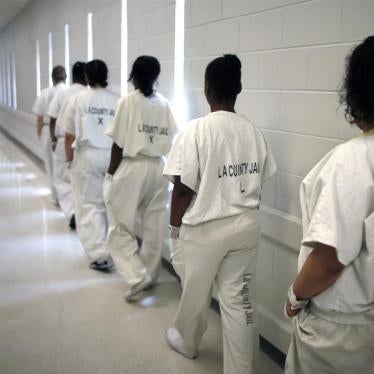(Ferguson) – US Attorney General Eric Holder should press state and local officials during his visit to Ferguson, Missouri, on August 20, 2014, to reform police practices to improve respect for basic rights, Human Rights Watch said today. Holder should also support federal reforms that could help address concerns about policing and racial discrimination raised during the Ferguson protests over the last 10 days.
“A lot of the poor policing we’re seeing in Ferguson may be going on elsewhere in the United States,” said Alba Morales, US criminal justice researcher at Human Rights Watch, who has been monitoring the situation in Ferguson since August 17. “Holder should press state and local officials to review their regulations and policies on policing, but he should also look at ways the federal government may be contributing to the problems there.”
Protests erupted in Ferguson, a predominantly African-American suburb north of St. Louis, after a police officer shot and killed Michael Brown, an unarmed 18-year-old, on August 9. While some looting has been reported, many media reports and accounts by witnesses have described the protests as largely peaceful.
Police have responded with threatening measures – such as pointing military assault rifles at peaceful protesters and deploying armored vehicles – that infringe on rights to peaceful assembly and expression. They have also used apparently unnecessary or excessive force – including firing teargas and rubber bullets into crowds, and arbitrarily detained journalists covering the events.
The police response to the protests has also raised concerns about the accountability of law enforcement, Human Rights Watch said. Some police officers were not wearing name tags or badges with visible numbers, witnesses said. Early in the police response, four law enforcement agencies were involved, with officials on the scene refusing to identify which agency was in charge. This made it difficult to determine whether each of the agencies had policies on the use of force and whether they were being followed.
Several Ferguson residents told Human Rights Watch that they were frustrated by the apparent absence of clear channels for filing complaints of police misconduct, and noted the lack of a transparent and effective police oversight mechanism. Community groups have called for the establishment of a civilian police review board in Ferguson. In addition, though the state of Missouri has been tracking traffic stop data since 2000, incidents triggered by racial profiling extend beyond traffic stops, and the state does not comprehensively report on excessive use of force incidents by law enforcement, Human Rights Watch said.
Missouri and other states concerned about improving police-community relations should consider passing laws requiring local governments to track alleged incidents of excessive force by law enforcement, and collecting data to help identify racial profiling practices, Human Rights Watch said. Local governments should consider establishing or strengthening civilian oversight boards to review alleged incidents of excessive force by law enforcement, and institute training for law enforcement to help recognize and eliminate biased policing.
On August 11, Holder announced a federal investigation into the Brown shooting. That investigation is being undertaking concurrently with an investigation by the Saint Louis County prosecuting attorney, Bob McCulloch. The governor of Missouri has the ability to instruct the state attorney general’s office to investigate the shooting as well, if McCulloch requests it.
Human Rights Watch urged Attorney General Holder to take the following steps at the federal level:
- Push for improvements in the federal collection of data on the use of excessive force by federal, state, local, and tribal law enforcement. Federal law (42 USC 14142) requires the US attorney general to collect data on the use of excessive force by law enforcement officers but does not require state, local, and tribal law enforcement to submit any information to the US government on excessive force incidents. The Justice Department has not collected – or has not been able to collect – that data in any useful way. Holder should work with Congress to give incentives to state and local authorities to provide data on excessive force incidents.
- Press Congress to pass the End Racial Profiling Act. The End Racial Profiling Act, which had been co-sponsored by President Barack Obama when he was a US senator, is pending before the US Congress. It would condition federal funding in part on certification by local law enforcement agencies that their members had been trained to eliminate practices that result in or encourage racial profiling. Training to eliminate racial profiling may help local law enforcement officials recognize bias and how it can affect their policing decisions and interactions with community members.
- Issue updated, stronger racial profiling guidance at the federal level. The New York Times reported in April that the Justice Department was on the verge of issuing an updated, stronger version of its Guidance Regarding the Use of Race by Federal Law Enforcement Agencies, first issued by the George W. Bush administration in 2003. The updated version has yet to be released.
“The unrest in Ferguson points to broader problems of policing in the US,” Morales said. “Ferguson is calling for changes. Attorney General Holder should offer them real reform.”







